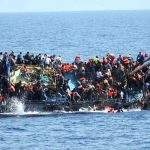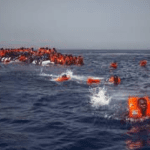More than 60 people are feared dead after a boat carrying migrants was found off Cape Verde in West Africa.
Thirty-eight people, including children, were rescued, with footage showing them being helped ashore, some on stretchers, on the island of Sal.
Almost all those on board the boat, which was at sea for over a month, are thought to have been from Senegal.
Cape Verde officials have called for global action on migration to help prevent further loss of life.
The vessel was first spotted on Monday, police told the AFP news agency. Initial reports suggested that the boat had sunk but it was later clarified that it had been found drifting.
The wooden pirogue style boat was seen almost 320km (200 miles) off Sal, a part of Cape Verde, by a Spanish fishing boat, which then alerted authorities, police said.
The survivors include four children aged between 12 and 16, a spokesperson for the International Organization for Migration (IOM) said.
The boat left the Senegalese fishing village of Fass Boye on 10 July with 101 people on board, Senegal’s foreign ministry said on Tuesday, citing survivors.
Moda Samb, an elected official in the village, told AFP news agency nearly all those on the boat had grown up in the community and that some local families were still waiting to hear whether their relatives were among the survivors.
The ministry said it was liaising with authorities in Cape Verde to arrange the repatriation of Senegalese nationals.
The passengers’ other countries of origin reportedly include Sierra Leone and, in one case, Guinea-Bissau.
University student Moussa Diop, who lives here, told me he had three male cousins and a teenage nephew on the boat that left in secret last month. His sister had no idea her son was on the boat – and had been in a desperate state since his disappearance last month.
The first the family heard about their doomed voyage was when one of the cousins sent Mr Diop a WhatsApp video from Sal on Wednesday to tell them that three of them had made it and were in hospital – but one of the young cousins had died.
Mr Diop says sorrow for lost relatives and relief about those who have survived has boiled over into frustration. After news of the tragedy spread on Wednesday, people in the town began damaging cars and boats and they also set fire to the house of the mayor.
Young people blame a lack of opportunities and want the authorities to do more to help them.
Jose Moreira, a health official on Sal, said the survivors were improving and were being looked after, with a focus on rehydration and tests for conditions like malaria.
Health Minister Filomena Goncalves said: “We know that migration issues are global issues, which require international co-operation, a lot of discussion and global strategy.
“We all – all the nations – have to sit down at the table and see what we can do so that we don’t lose any more lives at sea, above all.”
IOM spokeswoman Safa Msehli said safe pathways for migration were “sorely lacking” and that their absence gave “room to smugglers and traffickers to put people on these deadly journeys”.
The survivors may have ended up in Cape Verde, but it was almost certainly not their intended destination.
The archipelago sits around 600km off the coast of West Africa and on the migration route to the Canary Islands, a Spanish territory seen by many as a route to the EU. According to the IOM, it is one of the most dangerous journeys any migrant can make.
“This devastating loss of life demonstrates the continued failure of the Europe’s hostile approach to refugee protection,” Natasha Tsangarides, Associate Director of Advocacy at Freedom from Torture, said.
As ever with irregular migration, exact figures are hard to come by, but between 2020 and 2023 at least 67,000 people arrived in the Canary Islands.
Over that same period, just over 2,500 lost their lives. The IOM point out that figure covers the deaths that have been registered. Given the irregular and secretive nature of the route, the true figure could be far higher.
So, what is driving people to leave their homes and risk such a dangerous journey? In many cases, poverty is thought to be a key factor. Europe is seen by many as a route to a better life for the person migrating, as well as remittances to support the families they leave behind.
There are, however, other factors at play as well. Much of West Africa is increasingly unstable, with coups and Islamist insurgencies making an already difficult situation worse.
In Senegal, opposition politicians have been imprisoned, with claims of violent crackdowns by the authorities. President Macky Sall recently announced he would not seek a third term in office, but tensions remain high.
More than 60 people are feared dead after a boat carrying migrants was found off Cape Verde in West Africa.
Thirty-eight people, including children, were rescued, with footage showing them being helped ashore, some on stretchers, on the island of Sal.
Almost all those on board the boat, which was at sea for over a month, are thought to have been from Senegal.
Cape Verde officials have called for global action on migration to help prevent further loss of life.
The vessel was first spotted on Monday, police told the AFP news agency. Initial reports suggested that the boat had sunk but it was later clarified that it had been found drifting.
The wooden pirogue style boat was seen almost 320km (200 miles) off Sal, a part of Cape Verde, by a Spanish fishing boat, which then alerted authorities, police said.
The survivors include four children aged between 12 and 16, a spokesperson for the International Organization for Migration (IOM) said.
The boat left the Senegalese fishing village of Fass Boye on 10 July with 101 people on board, Senegal’s foreign ministry said on Tuesday, citing survivors.
Moda Samb, an elected official in the village, told AFP news agency nearly all those on the boat had grown up in the community and that some local families were still waiting to hear whether their relatives were among the survivors.
The ministry said it was liaising with authorities in Cape Verde to arrange the repatriation of Senegalese nationals.
The passengers’ other countries of origin reportedly include Sierra Leone and, in one case, Guinea-Bissau.
University student Moussa Diop, who lives here, told me he had three male cousins and a teenage nephew on the boat that left in secret last month. His sister had no idea her son was on the boat – and had been in a desperate state since his disappearance last month.
The first the family heard about their doomed voyage was when one of the cousins sent Mr Diop a WhatsApp video from Sal on Wednesday to tell them that three of them had made it and were in hospital – but one of the young cousins had died.
Mr Diop says sorrow for lost relatives and relief about those who have survived has boiled over into frustration. After news of the tragedy spread on Wednesday, people in the town began damaging cars and boats and they also set fire to the house of the mayor.
Young people blame a lack of opportunities and want the authorities to do more to help them.
Jose Moreira, a health official on Sal, said the survivors were improving and were being looked after, with a focus on rehydration and tests for conditions like malaria.
Health Minister Filomena Goncalves said: “We know that migration issues are global issues, which require international co-operation, a lot of discussion and global strategy.
“We all – all the nations – have to sit down at the table and see what we can do so that we don’t lose any more lives at sea, above all.”
IOM spokeswoman Safa Msehli said safe pathways for migration were “sorely lacking” and that their absence gave “room to smugglers and traffickers to put people on these deadly journeys”.
The survivors may have ended up in Cape Verde, but it was almost certainly not their intended destination.
The archipelago sits around 600km off the coast of West Africa and on the migration route to the Canary Islands, a Spanish territory seen by many as a route to the EU. According to the IOM, it is one of the most dangerous journeys any migrant can make.
“This devastating loss of life demonstrates the continued failure of the Europe’s hostile approach to refugee protection,” Natasha Tsangarides, Associate Director of Advocacy at Freedom from Torture, said.
As ever with irregular migration, exact figures are hard to come by, but between 2020 and 2023 at least 67,000 people arrived in the Canary Islands.
Over that same period, just over 2,500 lost their lives. The IOM point out that figure covers the deaths that have been registered. Given the irregular and secretive nature of the route, the true figure could be far higher.
So, what is driving people to leave their homes and risk such a dangerous journey? In many cases, poverty is thought to be a key factor. Europe is seen by many as a route to a better life for the person migrating, as well as remittances to support the families they leave behind.
There are, however, other factors at play as well. Much of West Africa is increasingly unstable, with coups and Islamist insurgencies making an already difficult situation worse.
In Senegal, opposition politicians have been imprisoned, with claims of violent crackdowns by the authorities. President Macky Sall recently announced he would not seek a third term in office, but tensions remain high.
More than 60 people are feared dead after a boat carrying migrants was found off Cape Verde in West Africa.
Thirty-eight people, including children, were rescued, with footage showing them being helped ashore, some on stretchers, on the island of Sal.
Almost all those on board the boat, which was at sea for over a month, are thought to have been from Senegal.
Cape Verde officials have called for global action on migration to help prevent further loss of life.
The vessel was first spotted on Monday, police told the AFP news agency. Initial reports suggested that the boat had sunk but it was later clarified that it had been found drifting.
The wooden pirogue style boat was seen almost 320km (200 miles) off Sal, a part of Cape Verde, by a Spanish fishing boat, which then alerted authorities, police said.
The survivors include four children aged between 12 and 16, a spokesperson for the International Organization for Migration (IOM) said.
The boat left the Senegalese fishing village of Fass Boye on 10 July with 101 people on board, Senegal’s foreign ministry said on Tuesday, citing survivors.
Moda Samb, an elected official in the village, told AFP news agency nearly all those on the boat had grown up in the community and that some local families were still waiting to hear whether their relatives were among the survivors.
The ministry said it was liaising with authorities in Cape Verde to arrange the repatriation of Senegalese nationals.
The passengers’ other countries of origin reportedly include Sierra Leone and, in one case, Guinea-Bissau.
University student Moussa Diop, who lives here, told me he had three male cousins and a teenage nephew on the boat that left in secret last month. His sister had no idea her son was on the boat – and had been in a desperate state since his disappearance last month.
The first the family heard about their doomed voyage was when one of the cousins sent Mr Diop a WhatsApp video from Sal on Wednesday to tell them that three of them had made it and were in hospital – but one of the young cousins had died.
Mr Diop says sorrow for lost relatives and relief about those who have survived has boiled over into frustration. After news of the tragedy spread on Wednesday, people in the town began damaging cars and boats and they also set fire to the house of the mayor.
Young people blame a lack of opportunities and want the authorities to do more to help them.
Jose Moreira, a health official on Sal, said the survivors were improving and were being looked after, with a focus on rehydration and tests for conditions like malaria.
Health Minister Filomena Goncalves said: “We know that migration issues are global issues, which require international co-operation, a lot of discussion and global strategy.
“We all – all the nations – have to sit down at the table and see what we can do so that we don’t lose any more lives at sea, above all.”
IOM spokeswoman Safa Msehli said safe pathways for migration were “sorely lacking” and that their absence gave “room to smugglers and traffickers to put people on these deadly journeys”.
The survivors may have ended up in Cape Verde, but it was almost certainly not their intended destination.
The archipelago sits around 600km off the coast of West Africa and on the migration route to the Canary Islands, a Spanish territory seen by many as a route to the EU. According to the IOM, it is one of the most dangerous journeys any migrant can make.
“This devastating loss of life demonstrates the continued failure of the Europe’s hostile approach to refugee protection,” Natasha Tsangarides, Associate Director of Advocacy at Freedom from Torture, said.
As ever with irregular migration, exact figures are hard to come by, but between 2020 and 2023 at least 67,000 people arrived in the Canary Islands.
Over that same period, just over 2,500 lost their lives. The IOM point out that figure covers the deaths that have been registered. Given the irregular and secretive nature of the route, the true figure could be far higher.
So, what is driving people to leave their homes and risk such a dangerous journey? In many cases, poverty is thought to be a key factor. Europe is seen by many as a route to a better life for the person migrating, as well as remittances to support the families they leave behind.
There are, however, other factors at play as well. Much of West Africa is increasingly unstable, with coups and Islamist insurgencies making an already difficult situation worse.
In Senegal, opposition politicians have been imprisoned, with claims of violent crackdowns by the authorities. President Macky Sall recently announced he would not seek a third term in office, but tensions remain high.
More than 60 people are feared dead after a boat carrying migrants was found off Cape Verde in West Africa.
Thirty-eight people, including children, were rescued, with footage showing them being helped ashore, some on stretchers, on the island of Sal.
Almost all those on board the boat, which was at sea for over a month, are thought to have been from Senegal.
Cape Verde officials have called for global action on migration to help prevent further loss of life.
The vessel was first spotted on Monday, police told the AFP news agency. Initial reports suggested that the boat had sunk but it was later clarified that it had been found drifting.
The wooden pirogue style boat was seen almost 320km (200 miles) off Sal, a part of Cape Verde, by a Spanish fishing boat, which then alerted authorities, police said.
The survivors include four children aged between 12 and 16, a spokesperson for the International Organization for Migration (IOM) said.
The boat left the Senegalese fishing village of Fass Boye on 10 July with 101 people on board, Senegal’s foreign ministry said on Tuesday, citing survivors.
Moda Samb, an elected official in the village, told AFP news agency nearly all those on the boat had grown up in the community and that some local families were still waiting to hear whether their relatives were among the survivors.
The ministry said it was liaising with authorities in Cape Verde to arrange the repatriation of Senegalese nationals.
The passengers’ other countries of origin reportedly include Sierra Leone and, in one case, Guinea-Bissau.
University student Moussa Diop, who lives here, told me he had three male cousins and a teenage nephew on the boat that left in secret last month. His sister had no idea her son was on the boat – and had been in a desperate state since his disappearance last month.
The first the family heard about their doomed voyage was when one of the cousins sent Mr Diop a WhatsApp video from Sal on Wednesday to tell them that three of them had made it and were in hospital – but one of the young cousins had died.
Mr Diop says sorrow for lost relatives and relief about those who have survived has boiled over into frustration. After news of the tragedy spread on Wednesday, people in the town began damaging cars and boats and they also set fire to the house of the mayor.
Young people blame a lack of opportunities and want the authorities to do more to help them.
Jose Moreira, a health official on Sal, said the survivors were improving and were being looked after, with a focus on rehydration and tests for conditions like malaria.
Health Minister Filomena Goncalves said: “We know that migration issues are global issues, which require international co-operation, a lot of discussion and global strategy.
“We all – all the nations – have to sit down at the table and see what we can do so that we don’t lose any more lives at sea, above all.”
IOM spokeswoman Safa Msehli said safe pathways for migration were “sorely lacking” and that their absence gave “room to smugglers and traffickers to put people on these deadly journeys”.
The survivors may have ended up in Cape Verde, but it was almost certainly not their intended destination.
The archipelago sits around 600km off the coast of West Africa and on the migration route to the Canary Islands, a Spanish territory seen by many as a route to the EU. According to the IOM, it is one of the most dangerous journeys any migrant can make.
“This devastating loss of life demonstrates the continued failure of the Europe’s hostile approach to refugee protection,” Natasha Tsangarides, Associate Director of Advocacy at Freedom from Torture, said.
As ever with irregular migration, exact figures are hard to come by, but between 2020 and 2023 at least 67,000 people arrived in the Canary Islands.
Over that same period, just over 2,500 lost their lives. The IOM point out that figure covers the deaths that have been registered. Given the irregular and secretive nature of the route, the true figure could be far higher.
So, what is driving people to leave their homes and risk such a dangerous journey? In many cases, poverty is thought to be a key factor. Europe is seen by many as a route to a better life for the person migrating, as well as remittances to support the families they leave behind.
There are, however, other factors at play as well. Much of West Africa is increasingly unstable, with coups and Islamist insurgencies making an already difficult situation worse.
In Senegal, opposition politicians have been imprisoned, with claims of violent crackdowns by the authorities. President Macky Sall recently announced he would not seek a third term in office, but tensions remain high.
More than 60 people are feared dead after a boat carrying migrants was found off Cape Verde in West Africa.
Thirty-eight people, including children, were rescued, with footage showing them being helped ashore, some on stretchers, on the island of Sal.
Almost all those on board the boat, which was at sea for over a month, are thought to have been from Senegal.
Cape Verde officials have called for global action on migration to help prevent further loss of life.
The vessel was first spotted on Monday, police told the AFP news agency. Initial reports suggested that the boat had sunk but it was later clarified that it had been found drifting.
The wooden pirogue style boat was seen almost 320km (200 miles) off Sal, a part of Cape Verde, by a Spanish fishing boat, which then alerted authorities, police said.
The survivors include four children aged between 12 and 16, a spokesperson for the International Organization for Migration (IOM) said.
The boat left the Senegalese fishing village of Fass Boye on 10 July with 101 people on board, Senegal’s foreign ministry said on Tuesday, citing survivors.
Moda Samb, an elected official in the village, told AFP news agency nearly all those on the boat had grown up in the community and that some local families were still waiting to hear whether their relatives were among the survivors.
The ministry said it was liaising with authorities in Cape Verde to arrange the repatriation of Senegalese nationals.
The passengers’ other countries of origin reportedly include Sierra Leone and, in one case, Guinea-Bissau.
University student Moussa Diop, who lives here, told me he had three male cousins and a teenage nephew on the boat that left in secret last month. His sister had no idea her son was on the boat – and had been in a desperate state since his disappearance last month.
The first the family heard about their doomed voyage was when one of the cousins sent Mr Diop a WhatsApp video from Sal on Wednesday to tell them that three of them had made it and were in hospital – but one of the young cousins had died.
Mr Diop says sorrow for lost relatives and relief about those who have survived has boiled over into frustration. After news of the tragedy spread on Wednesday, people in the town began damaging cars and boats and they also set fire to the house of the mayor.
Young people blame a lack of opportunities and want the authorities to do more to help them.
Jose Moreira, a health official on Sal, said the survivors were improving and were being looked after, with a focus on rehydration and tests for conditions like malaria.
Health Minister Filomena Goncalves said: “We know that migration issues are global issues, which require international co-operation, a lot of discussion and global strategy.
“We all – all the nations – have to sit down at the table and see what we can do so that we don’t lose any more lives at sea, above all.”
IOM spokeswoman Safa Msehli said safe pathways for migration were “sorely lacking” and that their absence gave “room to smugglers and traffickers to put people on these deadly journeys”.
The survivors may have ended up in Cape Verde, but it was almost certainly not their intended destination.
The archipelago sits around 600km off the coast of West Africa and on the migration route to the Canary Islands, a Spanish territory seen by many as a route to the EU. According to the IOM, it is one of the most dangerous journeys any migrant can make.
“This devastating loss of life demonstrates the continued failure of the Europe’s hostile approach to refugee protection,” Natasha Tsangarides, Associate Director of Advocacy at Freedom from Torture, said.
As ever with irregular migration, exact figures are hard to come by, but between 2020 and 2023 at least 67,000 people arrived in the Canary Islands.
Over that same period, just over 2,500 lost their lives. The IOM point out that figure covers the deaths that have been registered. Given the irregular and secretive nature of the route, the true figure could be far higher.
So, what is driving people to leave their homes and risk such a dangerous journey? In many cases, poverty is thought to be a key factor. Europe is seen by many as a route to a better life for the person migrating, as well as remittances to support the families they leave behind.
There are, however, other factors at play as well. Much of West Africa is increasingly unstable, with coups and Islamist insurgencies making an already difficult situation worse.
In Senegal, opposition politicians have been imprisoned, with claims of violent crackdowns by the authorities. President Macky Sall recently announced he would not seek a third term in office, but tensions remain high.
More than 60 people are feared dead after a boat carrying migrants was found off Cape Verde in West Africa.
Thirty-eight people, including children, were rescued, with footage showing them being helped ashore, some on stretchers, on the island of Sal.
Almost all those on board the boat, which was at sea for over a month, are thought to have been from Senegal.
Cape Verde officials have called for global action on migration to help prevent further loss of life.
The vessel was first spotted on Monday, police told the AFP news agency. Initial reports suggested that the boat had sunk but it was later clarified that it had been found drifting.
The wooden pirogue style boat was seen almost 320km (200 miles) off Sal, a part of Cape Verde, by a Spanish fishing boat, which then alerted authorities, police said.
The survivors include four children aged between 12 and 16, a spokesperson for the International Organization for Migration (IOM) said.
The boat left the Senegalese fishing village of Fass Boye on 10 July with 101 people on board, Senegal’s foreign ministry said on Tuesday, citing survivors.
Moda Samb, an elected official in the village, told AFP news agency nearly all those on the boat had grown up in the community and that some local families were still waiting to hear whether their relatives were among the survivors.
The ministry said it was liaising with authorities in Cape Verde to arrange the repatriation of Senegalese nationals.
The passengers’ other countries of origin reportedly include Sierra Leone and, in one case, Guinea-Bissau.
University student Moussa Diop, who lives here, told me he had three male cousins and a teenage nephew on the boat that left in secret last month. His sister had no idea her son was on the boat – and had been in a desperate state since his disappearance last month.
The first the family heard about their doomed voyage was when one of the cousins sent Mr Diop a WhatsApp video from Sal on Wednesday to tell them that three of them had made it and were in hospital – but one of the young cousins had died.
Mr Diop says sorrow for lost relatives and relief about those who have survived has boiled over into frustration. After news of the tragedy spread on Wednesday, people in the town began damaging cars and boats and they also set fire to the house of the mayor.
Young people blame a lack of opportunities and want the authorities to do more to help them.
Jose Moreira, a health official on Sal, said the survivors were improving and were being looked after, with a focus on rehydration and tests for conditions like malaria.
Health Minister Filomena Goncalves said: “We know that migration issues are global issues, which require international co-operation, a lot of discussion and global strategy.
“We all – all the nations – have to sit down at the table and see what we can do so that we don’t lose any more lives at sea, above all.”
IOM spokeswoman Safa Msehli said safe pathways for migration were “sorely lacking” and that their absence gave “room to smugglers and traffickers to put people on these deadly journeys”.
The survivors may have ended up in Cape Verde, but it was almost certainly not their intended destination.
The archipelago sits around 600km off the coast of West Africa and on the migration route to the Canary Islands, a Spanish territory seen by many as a route to the EU. According to the IOM, it is one of the most dangerous journeys any migrant can make.
“This devastating loss of life demonstrates the continued failure of the Europe’s hostile approach to refugee protection,” Natasha Tsangarides, Associate Director of Advocacy at Freedom from Torture, said.
As ever with irregular migration, exact figures are hard to come by, but between 2020 and 2023 at least 67,000 people arrived in the Canary Islands.
Over that same period, just over 2,500 lost their lives. The IOM point out that figure covers the deaths that have been registered. Given the irregular and secretive nature of the route, the true figure could be far higher.
So, what is driving people to leave their homes and risk such a dangerous journey? In many cases, poverty is thought to be a key factor. Europe is seen by many as a route to a better life for the person migrating, as well as remittances to support the families they leave behind.
There are, however, other factors at play as well. Much of West Africa is increasingly unstable, with coups and Islamist insurgencies making an already difficult situation worse.
In Senegal, opposition politicians have been imprisoned, with claims of violent crackdowns by the authorities. President Macky Sall recently announced he would not seek a third term in office, but tensions remain high.
More than 60 people are feared dead after a boat carrying migrants was found off Cape Verde in West Africa.
Thirty-eight people, including children, were rescued, with footage showing them being helped ashore, some on stretchers, on the island of Sal.
Almost all those on board the boat, which was at sea for over a month, are thought to have been from Senegal.
Cape Verde officials have called for global action on migration to help prevent further loss of life.
The vessel was first spotted on Monday, police told the AFP news agency. Initial reports suggested that the boat had sunk but it was later clarified that it had been found drifting.
The wooden pirogue style boat was seen almost 320km (200 miles) off Sal, a part of Cape Verde, by a Spanish fishing boat, which then alerted authorities, police said.
The survivors include four children aged between 12 and 16, a spokesperson for the International Organization for Migration (IOM) said.
The boat left the Senegalese fishing village of Fass Boye on 10 July with 101 people on board, Senegal’s foreign ministry said on Tuesday, citing survivors.
Moda Samb, an elected official in the village, told AFP news agency nearly all those on the boat had grown up in the community and that some local families were still waiting to hear whether their relatives were among the survivors.
The ministry said it was liaising with authorities in Cape Verde to arrange the repatriation of Senegalese nationals.
The passengers’ other countries of origin reportedly include Sierra Leone and, in one case, Guinea-Bissau.
University student Moussa Diop, who lives here, told me he had three male cousins and a teenage nephew on the boat that left in secret last month. His sister had no idea her son was on the boat – and had been in a desperate state since his disappearance last month.
The first the family heard about their doomed voyage was when one of the cousins sent Mr Diop a WhatsApp video from Sal on Wednesday to tell them that three of them had made it and were in hospital – but one of the young cousins had died.
Mr Diop says sorrow for lost relatives and relief about those who have survived has boiled over into frustration. After news of the tragedy spread on Wednesday, people in the town began damaging cars and boats and they also set fire to the house of the mayor.
Young people blame a lack of opportunities and want the authorities to do more to help them.
Jose Moreira, a health official on Sal, said the survivors were improving and were being looked after, with a focus on rehydration and tests for conditions like malaria.
Health Minister Filomena Goncalves said: “We know that migration issues are global issues, which require international co-operation, a lot of discussion and global strategy.
“We all – all the nations – have to sit down at the table and see what we can do so that we don’t lose any more lives at sea, above all.”
IOM spokeswoman Safa Msehli said safe pathways for migration were “sorely lacking” and that their absence gave “room to smugglers and traffickers to put people on these deadly journeys”.
The survivors may have ended up in Cape Verde, but it was almost certainly not their intended destination.
The archipelago sits around 600km off the coast of West Africa and on the migration route to the Canary Islands, a Spanish territory seen by many as a route to the EU. According to the IOM, it is one of the most dangerous journeys any migrant can make.
“This devastating loss of life demonstrates the continued failure of the Europe’s hostile approach to refugee protection,” Natasha Tsangarides, Associate Director of Advocacy at Freedom from Torture, said.
As ever with irregular migration, exact figures are hard to come by, but between 2020 and 2023 at least 67,000 people arrived in the Canary Islands.
Over that same period, just over 2,500 lost their lives. The IOM point out that figure covers the deaths that have been registered. Given the irregular and secretive nature of the route, the true figure could be far higher.
So, what is driving people to leave their homes and risk such a dangerous journey? In many cases, poverty is thought to be a key factor. Europe is seen by many as a route to a better life for the person migrating, as well as remittances to support the families they leave behind.
There are, however, other factors at play as well. Much of West Africa is increasingly unstable, with coups and Islamist insurgencies making an already difficult situation worse.
In Senegal, opposition politicians have been imprisoned, with claims of violent crackdowns by the authorities. President Macky Sall recently announced he would not seek a third term in office, but tensions remain high.
More than 60 people are feared dead after a boat carrying migrants was found off Cape Verde in West Africa.
Thirty-eight people, including children, were rescued, with footage showing them being helped ashore, some on stretchers, on the island of Sal.
Almost all those on board the boat, which was at sea for over a month, are thought to have been from Senegal.
Cape Verde officials have called for global action on migration to help prevent further loss of life.
The vessel was first spotted on Monday, police told the AFP news agency. Initial reports suggested that the boat had sunk but it was later clarified that it had been found drifting.
The wooden pirogue style boat was seen almost 320km (200 miles) off Sal, a part of Cape Verde, by a Spanish fishing boat, which then alerted authorities, police said.
The survivors include four children aged between 12 and 16, a spokesperson for the International Organization for Migration (IOM) said.
The boat left the Senegalese fishing village of Fass Boye on 10 July with 101 people on board, Senegal’s foreign ministry said on Tuesday, citing survivors.
Moda Samb, an elected official in the village, told AFP news agency nearly all those on the boat had grown up in the community and that some local families were still waiting to hear whether their relatives were among the survivors.
The ministry said it was liaising with authorities in Cape Verde to arrange the repatriation of Senegalese nationals.
The passengers’ other countries of origin reportedly include Sierra Leone and, in one case, Guinea-Bissau.
University student Moussa Diop, who lives here, told me he had three male cousins and a teenage nephew on the boat that left in secret last month. His sister had no idea her son was on the boat – and had been in a desperate state since his disappearance last month.
The first the family heard about their doomed voyage was when one of the cousins sent Mr Diop a WhatsApp video from Sal on Wednesday to tell them that three of them had made it and were in hospital – but one of the young cousins had died.
Mr Diop says sorrow for lost relatives and relief about those who have survived has boiled over into frustration. After news of the tragedy spread on Wednesday, people in the town began damaging cars and boats and they also set fire to the house of the mayor.
Young people blame a lack of opportunities and want the authorities to do more to help them.
Jose Moreira, a health official on Sal, said the survivors were improving and were being looked after, with a focus on rehydration and tests for conditions like malaria.
Health Minister Filomena Goncalves said: “We know that migration issues are global issues, which require international co-operation, a lot of discussion and global strategy.
“We all – all the nations – have to sit down at the table and see what we can do so that we don’t lose any more lives at sea, above all.”
IOM spokeswoman Safa Msehli said safe pathways for migration were “sorely lacking” and that their absence gave “room to smugglers and traffickers to put people on these deadly journeys”.
The survivors may have ended up in Cape Verde, but it was almost certainly not their intended destination.
The archipelago sits around 600km off the coast of West Africa and on the migration route to the Canary Islands, a Spanish territory seen by many as a route to the EU. According to the IOM, it is one of the most dangerous journeys any migrant can make.
“This devastating loss of life demonstrates the continued failure of the Europe’s hostile approach to refugee protection,” Natasha Tsangarides, Associate Director of Advocacy at Freedom from Torture, said.
As ever with irregular migration, exact figures are hard to come by, but between 2020 and 2023 at least 67,000 people arrived in the Canary Islands.
Over that same period, just over 2,500 lost their lives. The IOM point out that figure covers the deaths that have been registered. Given the irregular and secretive nature of the route, the true figure could be far higher.
So, what is driving people to leave their homes and risk such a dangerous journey? In many cases, poverty is thought to be a key factor. Europe is seen by many as a route to a better life for the person migrating, as well as remittances to support the families they leave behind.
There are, however, other factors at play as well. Much of West Africa is increasingly unstable, with coups and Islamist insurgencies making an already difficult situation worse.
In Senegal, opposition politicians have been imprisoned, with claims of violent crackdowns by the authorities. President Macky Sall recently announced he would not seek a third term in office, but tensions remain high.














